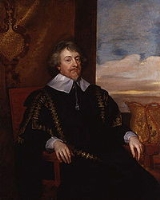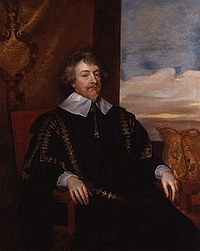
John Finch
Encyclopedia

House of Commons of England
The House of Commons of England was the lower house of the Parliament of England from its development in the 14th century to the union of England and Scotland in 1707, when it was replaced by the House of Commons of Great Britain...
at various times between 1614 and 1629. He was Speaker of the House of Commons
Speaker of the British House of Commons
The Speaker of the House of Commons is the presiding officer of the House of Commons, the United Kingdom's lower chamber of Parliament. The current Speaker is John Bercow, who was elected on 22 June 2009, following the resignation of Michael Martin...
.
Early life
Finch was the son of Sir Henry FinchHenry Finch
Sir Henry Finch was an English lawyer and politician, created serjeant-at-law and knighted, and remembered as a legal writer.-Life:He was born the son of Sir Thomas Finch of Eastwell and the brother of Moyle Finch...
of Eastwell, Kent. He was admitted to Emmanuel College, Cambridge
Emmanuel College, Cambridge
Emmanuel College is a constituent college of the University of Cambridge.The college was founded in 1584 by Sir Walter Mildmay on the site of a Dominican friary...
in 1596 and admitted at Gray's Inn
Gray's Inn
The Honourable Society of Gray's Inn, commonly known as Gray's Inn, is one of the four Inns of Court in London. To be called to the Bar and practise as a barrister in England and Wales, an individual must belong to one of these Inns...
on 5 February 1601. He was called to the bar in November 1611.
Political career
Finch was elected Member of ParliamentMember of Parliament
A Member of Parliament is a representative of the voters to a :parliament. In many countries with bicameral parliaments, the term applies specifically to members of the lower house, as upper houses often have a different title, such as senate, and thus also have different titles for its members,...
for Canterbury
Canterbury (UK Parliament constituency)
Canterbury is a county constituency which has been represented in the House of Commons of the Parliament of the United Kingdom since 1918. It elects one Member of Parliament by the first past the post system of election....
in 1614, and became recorder of the same place in 1619. He was re-elected MP for Canterbury in 1621. In his capacity as recorder, he welcomed King Charles I
Charles I of England
Charles I was King of England, King of Scotland, and King of Ireland from 27 March 1625 until his execution in 1649. Charles engaged in a struggle for power with the Parliament of England, attempting to obtain royal revenue whilst Parliament sought to curb his Royal prerogative which Charles...
when he arrived at Canterbury
Canterbury
Canterbury is a historic English cathedral city, which lies at the heart of the City of Canterbury, a district of Kent in South East England. It lies on the River Stour....
for his marriage in Canterbury Cathedral
Canterbury Cathedral
Canterbury Cathedral in Canterbury, Kent, is one of the oldest and most famous Christian structures in England and forms part of a World Heritage Site....
on 13 June 1625, and Finch was knighted by the King two days later on 15 June. He became King's Counsel in 1626. He was re-elected MP for Canterbury in 1626 and 1628. In 1628 Finch was elected Speaker, a post which he retained until 1629 when Parliament was dissolved. He was held down in his chair by Holles and others on the occasion of Sir John Eliot's
John Eliot (statesman)
Sir John Eliot was an English statesman who was serially imprisoned in the Tower of London, where he eventually died, by King Charles I for advocating the rights and privileges of Parliament.-Family and early life:...
resolution on tonnage and poundage
Tonnage and Poundage
Tonnage and Poundage were certain duties and taxes first levied in Edward II's reign on every tun of imported wine, which came mostly from Spain and Portugal, and on every pound weight of merchandise exported or imported. Traditionally tonnage and poundage was granted by Parliament to the king...
.
Judicial career
In 1634 Finch was appointed chief justice of the Court of Common PleasCourt of Common Pleas (England)
The Court of Common Pleas, or Common Bench, was a common law court in the English legal system that covered "common pleas"; actions between subject and subject, which did not concern the king. Created in the late 12th to early 13th century after splitting from the Exchequer of Pleas, the Common...
, and distinguished himself by the active zeal with which he upheld the king's prerogative. Notable also was the brutality which characterized his conduct as chief justice, particularly in the cases of William Prynne
William Prynne
William Prynne was an English lawyer, author, polemicist, and political figure. He was a prominent Puritan opponent of the church policy of the Archbishop of Canterbury, William Laud. Although his views on church polity were presbyterian, he became known in the 1640s as an Erastian, arguing for...
and John Langton.
Finch presided over the trial of John Hampden
John Hampden
John Hampden was an English politician, the eldest son of William Hampden, of Hampden House, Great Hampden in Buckinghamshire, John Hampden (ca. 15951643) was an English politician, the eldest son of William Hampden, of Hampden House, Great Hampden in Buckinghamshire, John Hampden (ca. 15951643)...
, who resisted the payment of ship money
Ship money
Ship money refers to a tax that Charles I of England tried to levy without the consent of Parliament. This tax, which was only applied to coastal towns during a time of war, was intended to offset the cost of defending that part of the coast, and could be paid in actual ships or the equivalent value...
, and was chiefly responsible for the decision of the judges that ship-money was constitutional. As a reward for his services he was, in 1640, appointed Lord Keeper of the Great Seal of England
Lord Keeper of the Great Seal
The Lord Keeper of the Great Seal of England, and later of Great Britain, was formerly an officer of the English Crown charged with physical custody of the Great Seal of England. This evolved into one of the Great Officers of State....
, and was also created Baron Finch, of Fordwich. He had, however, become so unpopular that one of the first acts of the Long Parliament
Long Parliament
The Long Parliament was made on 3 November 1640, following the Bishops' Wars. It received its name from the fact that through an Act of Parliament, it could only be dissolved with the agreement of the members, and those members did not agree to its dissolution until after the English Civil War and...
, which met in the same year was his impeachment
Impeachment
Impeachment is a formal process in which an official is accused of unlawful activity, the outcome of which, depending on the country, may include the removal of that official from office as well as other punishment....
. His estates were sequestrated and he took refuge in Holland. The Great Seal was passed to Edward Littleton
Edward Littleton, 1st Baron Lyttleton of Mounslow
Edward, Baron Littleton , from Munslow in Shropshire, was a Chief Justice of North Wales. He was descended from the judge and legal scholar, Thomas de Littleton. His father, also Edward, had been Chief Justice of North Wales before him.-Education and career:He was educated at Oxford before...
.
When he was allowed to return to England is uncertain, but in 1660 he was one of the commissioners for the trial of the regicide
Regicide
The broad definition of regicide is the deliberate killing of a monarch, or the person responsible for the killing of a monarch. In a narrower sense, in the British tradition, it refers to the judicial execution of a king after a trial...
s, though he does not appear to have taken much part in the proceedings. He died on 27 November 1660 and was buried in St Martins church near Canterbury, his peerage becoming extinct.

